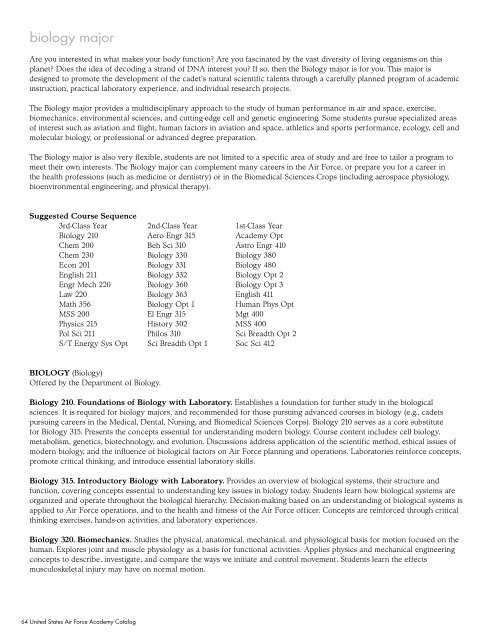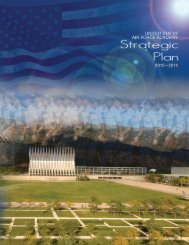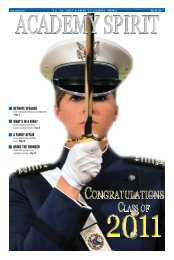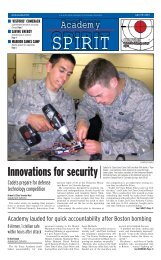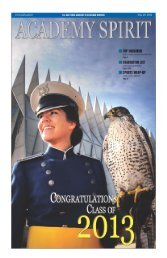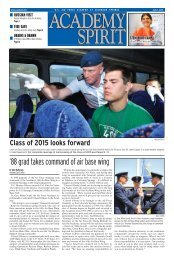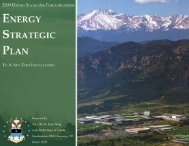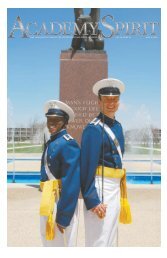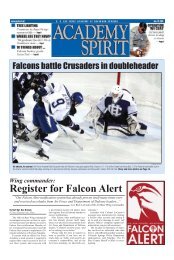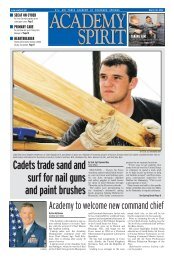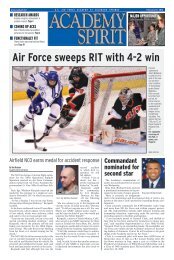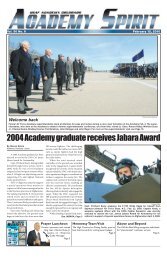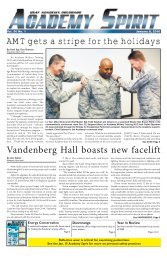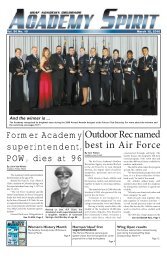2008-2009 Catalog - United States Air Force Academy
2008-2009 Catalog - United States Air Force Academy
2008-2009 Catalog - United States Air Force Academy
You also want an ePaper? Increase the reach of your titles
YUMPU automatically turns print PDFs into web optimized ePapers that Google loves.
iology major<br />
Are you interested in what makes your body function? Are you fascinated by the vast diversity of living organisms on this<br />
planet? Does the idea of decoding a strand of DNA interest you? If so, then the Biology major is for you. This major is<br />
designed to promote the development of the cadet’s natural scientific talents through a carefully planned program of academic<br />
instruction, practical laboratory experience, and individual research projects.<br />
The Biology major provides a multidisciplinary approach to the study of human performance in air and space, exercise,<br />
biomechanics, environmental sciences, and cutting-edge cell and genetic engineering. Some students pursue specialized areas<br />
of interest such as aviation and flight, human factors in aviation and space, athletics and sports performance, ecology, cell and<br />
molecular biology, or professional or advanced degree preparation.<br />
The Biology major is also very flexible, students are not limited to a specific area of study and are free to tailor a program to<br />
meet their own interests. The Biology major can complement many careers in the <strong>Air</strong> <strong>Force</strong>, or prepare you for a career in<br />
the health professions (such as medicine or dentistry) or in the Biomedical Sciences Crops (including aerospace physiology,<br />
bioenvironmental engineering, and physical therapy).<br />
Suggested Course Sequence<br />
3rd-Class Year 2nd-Class Year 1st-Class Year<br />
Biology 210 Aero Engr 315 <strong>Academy</strong> Opt<br />
Chem 200 Beh Sci 310 Astro Engr 410<br />
Chem 230 Biology 330 Biology 380<br />
Econ 201 Biology 331 Biology 480<br />
English 211 Biology 332 Biology Opt 2<br />
Engr Mech 220 Biology 360 Biology Opt 3<br />
Law 220 Biology 363 English 411<br />
Math 356 Biology Opt 1 Human Phys Opt<br />
MSS 200 El Engr 315 Mgt 400<br />
Physics 215 History 302 MSS 400<br />
Pol Sci 211 Philos 310 Sci Breadth Opt 2<br />
S/T Energy Sys Opt Sci Breadth Opt 1 Soc Sci 412<br />
BIOLOGY (Biology)<br />
Offered by the Department of Biology.<br />
Biology 210. Foundations of Biology with Laboratory. Establishes a foundation for further study in the biological<br />
sciences. It is required for biology majors, and recommended for those pursuing advanced courses in biology (e.g., cadets<br />
pursuing careers in the Medical, Dental, Nursing, and Biomedical Sciences Corps). Biology 210 serves as a core substitute<br />
for Biology 315. Presents the concepts essential for understanding modern biology. Course content includes: cell biology,<br />
metabolism, genetics, biotechnology, and evolution. Discussions address application of the scientific method, ethical issues of<br />
modern biology, and the influence of biological factors on <strong>Air</strong> <strong>Force</strong> planning and operations. Laboratories reinforce concepts,<br />
promote critical thinking, and introduce essential laboratory skills.<br />
Biology 315. Introductory Biology with Laboratory. Provides an overview of biological systems, their structure and<br />
function, covering concepts essential to understanding key issues in biology today. Students learn how biological systems are<br />
organized and operate throughout the biological hierarchy. Decision-making based on an understanding of biological systems is<br />
applied to <strong>Air</strong> <strong>Force</strong> operations, and to the health and fitness of the <strong>Air</strong> <strong>Force</strong> officer. Concepts are reinforced through critical<br />
thinking exercises, hands-on activities, and laboratory experiences.<br />
Biology 320. Biomechanics. Studies the physical, anatomical, mechanical, and physiological basis for motion focused on the<br />
human. Explores joint and muscle physiology as a basis for functional activities. Applies physics and mechanical engineering<br />
concepts to describe, investigate, and compare the ways we initiate and control movement. Students learn the effects<br />
musculoskeletal injury may have on normal motion.<br />
64 <strong>United</strong> <strong>States</strong> <strong>Air</strong> <strong>Force</strong> <strong>Academy</strong> <strong>Catalog</strong>


